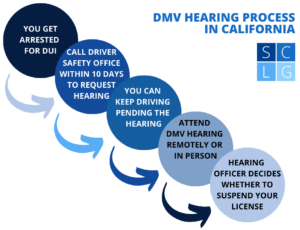In California, you must contact the DMV within 10 days after your DUI arrest to request a stay and a hearing. You do this by either calling or faxing a DMV Driver Safety Office. If you are represented by a DUI defense attorney, the attorney generally handles this on your behalf.
“A stay” refers to a stay of the license suspension. This allows you to keep driving on a temporary license if the DMV does not conduct a hearing within 30 days from the date of your arrest.
A DMV hearing after a DUI is an administrative procedure where:
- you appear before a DMV hearing officer, and
- try to prevent the Department from suspending your driving privileges.
Note that following a DUI:
- the arresting officer seizes your driver’s license, and
- the DMV can suspend your license.
The length of the suspension will be:
- up to a 4-month license suspension for a first-time DUI conviction, or
- up to a 1-year license suspension for a second DUI conviction.

Our DMV hearing attorneys will discuss the following in this article:
- 1. What should I request following a California DUI?
- 2. How do I make this request?
- 3. What is the 10-day requirement?
- 4. What is “a stay?”
- 5. What is a DMV DUI hearing?

You must contact the DMV within 10 days after a DUI arrest to request “a stay” and a hearing.
1. What should I request following a California DUI?
If you are arrested in California for DUI, you must contact the DMV and request:
- a stay, and
- a DMV hearing.
You must do this within 10 days of your arrest.
2. How do I make this request?
You can make this request to the DMV via either:
- the phone, or
- a fax.1
You make this request to a Driver Safety Office (located in the county where the arrest was made). This is not the same as a local neighborhood DMV office.
2.1. Phone request
A phone request simply means:
- you call the applicable Driver Safety Office, and
- ask for both a stay and a hearing.
You should also ask for “Discovery.” This is a request for the police report that documented the DUI in question.
You should have a copy of your ticket when the call is made. This is because the DMV employee handling the call will ask for:
- the date of the arrest,
- the location of the arrest,
- the name and ID number of the arresting officer, and
- the type of test that was administered (e.g., blood test).
2.2. Fax request
A fax request means:
- you fax the applicable Driver Safety Office, and
- ask for both a stay and a hearing.
When a fax is used, you fax a letter that includes the following information:
- your name,
- your license number,
- the date of your arrest,
- the location of your arrest,
- the name of the police agency that made your arrest,
- the name and ID number of the arresting officer,
- the type of test that was administered, and
- your contact information.
Note that most of the above information can be found on your ticket for the arrest.
When a fax is used, you will want to get a fax confirmation. This will confirm:
- the date and time of the fax, and
- the Driver Safety Office fax number that was used.

You must request a stay and a hearing within 10 days from the date of your DUI arrest.
3. What is the 10-day requirement?
You must request a stay and a hearing within 10 days from the date of your DUI arrest.
For example, if you were arrested on April 5, you have to make the request by April 15.
The DMV is very strict about this timing requirement. If you make a request after the 10 days, the DMV can suspend your driving privileges.
4. What is “a stay?”
A stay refers to a “stay of suspension.”
Note that the police seize your driver’s license after your DUI arrest. Once you request a hearing, the DMV then issues a 30-day temporary driver’s license. This allows you to continue driving for 30 days, despite not having a license.2
The temporary license is “30 days” because a DMV goal is to:
- hold its hearing within 30 days, and
- do so within 30 days from the date of your arrest.
There are situations, though, when the DMV does not conduct a hearing within 30 days. When this happens, the stay request means the DMV will not terminate your 30-day license.
Rather, the DMV grants you unrestricted driving privileges. These are good until:
- a hearing is conducted, and
- the DMV makes a suspension decision.3
5. What is a DMV DUI hearing?
A DMV hearing is an administrative procedure where:
- you appear before a DMV hearing officer, and
- try to prevent the Department from suspending your driving privileges.4
Note that following a DUI:
- the arresting officer seizes your driver’s license, and
- the DMV can suspend your license.
All administrative hearings are conducted at a DMV office.
The hearings are held before a DMV hearing officer. This is a DMV employee and is not:
- a judge, or
- an attorney.
A hearing runs like a California criminal trial. The DMV and you have the opportunity to present evidence and prove your respective cases. Note that you have the right to be represented by a DUI lawyer at these hearings.5
After the evidence is presented, the hearing officer rules for or against you. If for, then your driver’s license suspension is set aside. If against, the officer orders a period of license suspension or revocation.6
The length of a suspension will be for:
- up to four months (if a first-time DUI conviction), or
- up to one year (if a second or subsequent DUI conviction).
Note that the penalties issued at a hearing are:
- separate from,
- any penalties ordered by a criminal court.7
This means you can be punished twice for the same DUI.
Legal References:
- California DMV website – Driving Under the Influence: Age 21 and Older (FFDL 35).
- See same.
- See same.
- California DMV website – DUI Arrest DMV Administrative Hearings vs Criminal Court Trials.
- See same.
- See same.
- See same.
